


Wreck of the U.S.S. Cairo
One of the most remarkable
artifacts in Vicksburg is the
wreck of the Civil War ironclad
U.S.S. Cairo. The gunboat is
now part of the national park.
One of the most remarkable
artifacts in Vicksburg is the
wreck of the Civil War ironclad
U.S.S. Cairo. The gunboat is
now part of the national park.
Union Battery at Vicksburg
Guns in this position shelled
Confederate defenders and
Vicksburg's civilians alike
during the 1863 Battle of
VIcksburg.
Guns in this position shelled
Confederate defenders and
Vicksburg's civilians alike
during the 1863 Battle of
VIcksburg.
The Historic City of Vicksburg, Mississippi
ExploreSouthernHistory.com - Historic Sites of Vicksburg, Mississippi
ExploreSouthernHistory.com - Historic Sites of Vicksburg, Mississippi
History on the Mississippi River
One of the most remarkable and historic
cities in America, Vicksburg is a charming
city of history and hospitality on the bluffs of
the Mississippi River.
Although the modern community was
founded in 1811, Vicksburg actually traces its
history back into Colonial times. The French
built Fort Saint-Pierre about 10 miles north of
the modern city on the Yazoo River bluffs in
1719. The fort did not survive long. Native
American warriors destroyed it about ten
years after it was built.
The vicinity, however, remained of strategic
importance. When the Spanish gained
possession of the Mississippi following the
American Revolution, they quickly decided to
plant a new fort in the Vicksburg area. A
settlement called Nogales or Walnut Hills
was established at Vicksburg in 1790. The
Walnut Hills name came from the fact that
the towering bluffs here were crowned by
walnut trees. A monument to the Spanish fort
can still be seen on the north side of town.
The Walnut Hills were transferred to the
United States as part of the Louisiana
Purchase and in 1811 the modern
community was founded on the strategic
bend of the Mississippi River.
Incorporated in 1825, Vicksburg went on to
become a major port and commercial center
on the river. One of the best known American
cities of the 19th century, it was a major stop
for paddlewheel riverboats making their way
up and down the Mississippi River and was
noted for its stores and luxurious homes and
hotels.
Future Confederate President Jefferson
Davis began his political career in Vicksburg
when he spoke on the grounds of what is
now the Old Courthouse Museum. He went
on to become a U.S. Senator and Secretary
of War before assuming his duties as the
only President of the Confederacy.
When the Civil War erupted in 1861, it quickly
became evident that Vicksburg would
become a critical strategic point. The city's
location on the commanding bluffs
overlooking a sharp bend of the Mississippi
River made it an obvious point for the
erection of artillery batteries by the Southern
army.
As Union armies and navies pushed their
way up and down the Mississippi River as
part of a grand strategy to strangle the
Confederacy, Vicksburg stood in their way.
Several campaigns against the city failed for
one reason or another until finally, in 1863,
General Ulysses S. Grant landed tens of
thousands of soldiers downriver near Port
Gibson and swung in behind Vicksburg after
fighting Confederate forces at Port Gibson,
Raymond, Jackson and other locations.
Grant launched two major efforts to storm the
city, but was driven back by determined
Confederate defenders. He then laid siege to
Vicksburg, surrounding the city with trenches
and artillery batteries. Tens of thousands of
cannonballs and shells rained on the city
and its defenders during the 47-day siege
and the citizens of Vicksburg were forced to
dig tunnels in order to escape the falling
bombs. By the end of the siege, many were
living on mules, rats and any other animals
they could find.
Confederate General John Pemberton
surrendered on July 4, 1863, and the forces
of General Grant marched into the city and
raised the U.S. flag from the clock tower atop
the Old Courthouse. Vicksburg remained in
Union hands for the rest of the Civil War.
Vicksburg became an important exchange
center at the end of the war, where prisoners
were released and allowed to return home.
cities in America, Vicksburg is a charming
city of history and hospitality on the bluffs of
the Mississippi River.
Although the modern community was
founded in 1811, Vicksburg actually traces its
history back into Colonial times. The French
built Fort Saint-Pierre about 10 miles north of
the modern city on the Yazoo River bluffs in
1719. The fort did not survive long. Native
American warriors destroyed it about ten
years after it was built.
The vicinity, however, remained of strategic
importance. When the Spanish gained
possession of the Mississippi following the
American Revolution, they quickly decided to
plant a new fort in the Vicksburg area. A
settlement called Nogales or Walnut Hills
was established at Vicksburg in 1790. The
Walnut Hills name came from the fact that
the towering bluffs here were crowned by
walnut trees. A monument to the Spanish fort
can still be seen on the north side of town.
The Walnut Hills were transferred to the
United States as part of the Louisiana
Purchase and in 1811 the modern
community was founded on the strategic
bend of the Mississippi River.
Incorporated in 1825, Vicksburg went on to
become a major port and commercial center
on the river. One of the best known American
cities of the 19th century, it was a major stop
for paddlewheel riverboats making their way
up and down the Mississippi River and was
noted for its stores and luxurious homes and
hotels.
Future Confederate President Jefferson
Davis began his political career in Vicksburg
when he spoke on the grounds of what is
now the Old Courthouse Museum. He went
on to become a U.S. Senator and Secretary
of War before assuming his duties as the
only President of the Confederacy.
When the Civil War erupted in 1861, it quickly
became evident that Vicksburg would
become a critical strategic point. The city's
location on the commanding bluffs
overlooking a sharp bend of the Mississippi
River made it an obvious point for the
erection of artillery batteries by the Southern
army.
As Union armies and navies pushed their
way up and down the Mississippi River as
part of a grand strategy to strangle the
Confederacy, Vicksburg stood in their way.
Several campaigns against the city failed for
one reason or another until finally, in 1863,
General Ulysses S. Grant landed tens of
thousands of soldiers downriver near Port
Gibson and swung in behind Vicksburg after
fighting Confederate forces at Port Gibson,
Raymond, Jackson and other locations.
Grant launched two major efforts to storm the
city, but was driven back by determined
Confederate defenders. He then laid siege to
Vicksburg, surrounding the city with trenches
and artillery batteries. Tens of thousands of
cannonballs and shells rained on the city
and its defenders during the 47-day siege
and the citizens of Vicksburg were forced to
dig tunnels in order to escape the falling
bombs. By the end of the siege, many were
living on mules, rats and any other animals
they could find.
Confederate General John Pemberton
surrendered on July 4, 1863, and the forces
of General Grant marched into the city and
raised the U.S. flag from the clock tower atop
the Old Courthouse. Vicksburg remained in
Union hands for the rest of the Civil War.
Vicksburg became an important exchange
center at the end of the war, where prisoners
were released and allowed to return home.

| The Mississippi River at Vicksburg Civil War cannon still aim out over the casinos and hotels lining the river at Vicksburg, Mississippi |
The city and surrounding area of Mississippi
and Louisiana was the scene of brutal
violence during the Reconstruction era, but
Vicksburg and its people survived. The city
rebounded and prosperity returned.
Today, Vicksburg is a beautiful, charming
and hospitable city that welcomes hundreds
of thousands of visitors each year. Many
come to learn more about the city's Civil War
past, but others come to play at the riverfront
casinos and enjoy the lively activities of the
city on the Mississippi.
The city serves its visitors with numerous
hotels, bed and breakfast inns, restaurants
and dining establishments. Numerous tour
services are available offering possibilities
ranging from ghost and carriage tours to river
rides and personal tours of the battlefield.
For more information on tour opportunities,
please click here.
The crown jewel of the city, of course, is the
Vicksburg National Military Park. Tour roads
of the park begin at the Visitor Center on Clay
Street (look for the brown signs on Interstate
40).
The park features a 16-mile tour road that
leads to stops at forts, batteries, attack sites,
historic structures, the Vicksburg National
Cemetery and the U.S.S. Cairo Museum
were a preserved Civil War ironclad is on
display. More than 1,330 monuments, some
of them quite magnificent, and thousands of
markers dot the landscape of one of the
largest battles ever fought on the North
American continent.
For more on the national park, please follow
the links below or visit the official park service
site by clicking here.
Vicksburg is located on the Mississippi River
less than 45 minutes west of Jackson,
Mississippi. An excellent place to begin your
tour of the city is at the website of the
Vicksburg Convention and Visitors Bureau.
They offer information on hotels, dining,
attractions, African American heritage, the
Civil War, tours and more.
and Louisiana was the scene of brutal
violence during the Reconstruction era, but
Vicksburg and its people survived. The city
rebounded and prosperity returned.
Today, Vicksburg is a beautiful, charming
and hospitable city that welcomes hundreds
of thousands of visitors each year. Many
come to learn more about the city's Civil War
past, but others come to play at the riverfront
casinos and enjoy the lively activities of the
city on the Mississippi.
The city serves its visitors with numerous
hotels, bed and breakfast inns, restaurants
and dining establishments. Numerous tour
services are available offering possibilities
ranging from ghost and carriage tours to river
rides and personal tours of the battlefield.
For more information on tour opportunities,
please click here.
The crown jewel of the city, of course, is the
Vicksburg National Military Park. Tour roads
of the park begin at the Visitor Center on Clay
Street (look for the brown signs on Interstate
40).
The park features a 16-mile tour road that
leads to stops at forts, batteries, attack sites,
historic structures, the Vicksburg National
Cemetery and the U.S.S. Cairo Museum
were a preserved Civil War ironclad is on
display. More than 1,330 monuments, some
of them quite magnificent, and thousands of
markers dot the landscape of one of the
largest battles ever fought on the North
American continent.
For more on the national park, please follow
the links below or visit the official park service
site by clicking here.
Vicksburg is located on the Mississippi River
less than 45 minutes west of Jackson,
Mississippi. An excellent place to begin your
tour of the city is at the website of the
Vicksburg Convention and Visitors Bureau.
They offer information on hotels, dining,
attractions, African American heritage, the
Civil War, tours and more.

Siege Gun at Vicksburg
One of the most devastating
sieges in history took place in
the hills and ravines around
Vicksburg, Mississippi
One of the most devastating
sieges in history took place in
the hills and ravines around
Vicksburg, Mississippi

Artillery Display at Vicksburg
An array of Civil War cannon
on display outside the Visitor
Center at Vicksburg National
Military Park demonstrate the
various pieces used during
the siege.
An array of Civil War cannon
on display outside the Visitor
Center at Vicksburg National
Military Park demonstrate the
various pieces used during
the siege.

Old Courthouse in Vicksburg
The historic Old Courthouse
in Vicksburg predates the
Civil War and was a major
landmark during the battle
and siege. Now a museum, it
houses a fascinating variety
of displays and artifacts.
The historic Old Courthouse
in Vicksburg predates the
Civil War and was a major
landmark during the battle
and siege. Now a museum, it
houses a fascinating variety
of displays and artifacts.

The Battle of Vicksburg, Mississippi
Vicksburg National Military Park
U.S.S. Cairo Museum
Old Courthouse Museum
Also of Interest...
Grand Gulf Military Monument
Battle of Raymond, Mississippi
Natchez Trace Parkway
Lake Providence, Louisiana
Historic Sites in Mississippi
Explore other Southern Historic Sites
Vicksburg National Military Park
U.S.S. Cairo Museum
Old Courthouse Museum
Also of Interest...
Grand Gulf Military Monument
Battle of Raymond, Mississippi
Natchez Trace Parkway
Lake Providence, Louisiana
Historic Sites in Mississippi
Explore other Southern Historic Sites
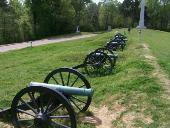
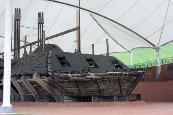
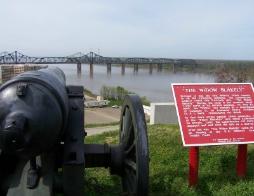
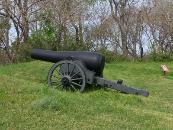
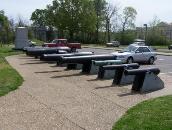


Custom Search
| Copyright 2011 by Dale Cox All rights reserved. |